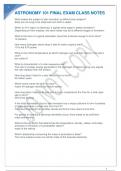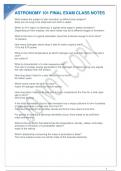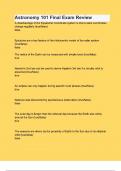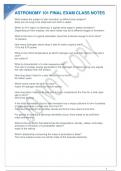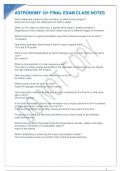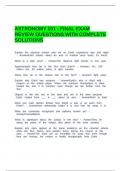Astronomy 101 final exam - Study guides, Class notes & Summaries
Looking for the best study guides, study notes and summaries about Astronomy 101 final exam? On this page you'll find 14 study documents about Astronomy 101 final exam.
All 14 results
Sort by
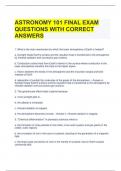
-
ASTRONOMY 101 FINAL EXAM QUESTIONS WITH CORRECT ANSWERS
- Exam (elaborations) • 42 pages • 2023
- Available in package deal
-
- $13.59
- + learn more
ASTRONOMY 101 FINAL EXAM QUESTIONS WITH CORRECT ANSWERS 1. What is the main mechanism by which the lower atmosphere of Earth is heated? a. Sunlight heats Earth's surface and the resultant heat is transferred to the atmosphere by infrared radiation and convective gas motions. b. Conduction carries heat from Earth's interior to the surface where conduction in the lower atmosphere transfers this heat to the higher layers. c. friction between the winds in the atmosphere and the mounta...
ASTRONOMY 101 FINAL EXAM CLASS NOTES
ASTRONOMY 101 FINAL EXAM CLASS NOTES
Astronomy 101 Final Exam Review
ASTRONOMY 101 FINAL EXAM CLASS NOTES
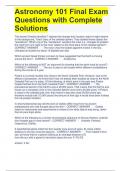
-
Astronomy 101 Final Exam Questions with Complete Solutions
- Exam (elaborations) • 8 pages • 2023
- Available in package deal
-
- $12.89
- + learn more
Astronomy 101 Final Exam Questions with Complete Solutions The ancient Greeks identified 7 objects that change their location night-to-night relative to the background, "fixed" stars of the celestial sphere. They dubbed these objects the "wanderers". Which one of the "wanderers" wanders the most (i.e., changes its position the most from one night to the next) relative to the fixed stars of the celestial sphere? - CORRECT ANSWER The moon (has the fastest apparent motion in the sky,...
ASTRONOMY 101 FINAL EXAM CLASS NOTES
ASTRONOMY 101 - FINAL EXAM REVIEW QUESTIONS WITH COMPLETE SOLUTIONS
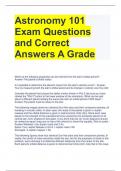
-
Bundle For Astronomy 101 Exam Questions and Answers All Correct
- Package deal • 9 items • 2023
-
- $47.49
- + learn more
Astronomy 101 Exam Questions and Correct Answers A Grade 2 Exam (elaborations) Astronomy 101 Final Test Questions and Answers All Correct 3 Exam (elaborations) Astronomy 101 Exam Questions with All Correct Answers 4 Exam (elaborations) Astronomy 101 Practice Test Questions and Correct Answers 5 Exam (elaborations) ASTRONOMY 101 FINAL EXAM QUEST

-
Introduction To Astronomy 101 Final Exam Questions With Correct Answers For Perfect Revisions.
- Exam (elaborations) • 1 pages • 2023
-
- $5.29
- + learn more
Introduction To Astronomy 101 Final Exam Questions With Correct Answers For Perfect Revisions. If the radius of an object's orbit is halved, and angular momentum is conserved, what must happen to the object's speed? - correct answers.It must be doubled. Unlike the giant planets, the terrestrial planets formed when - correct inner Solar System was hotter than the outer Solar System The terrestrial planets and the giant planets have different compositions because - correct ...

How did he do that? By selling his study resources on Stuvia. Try it yourself! Discover all about earning on Stuvia

